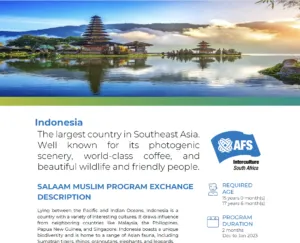Download the Indonesian Program Brochure
During the programme you will receive:
SUPPORT: AFS provides support to participants before, during, and after the exchange. AFS hosts local and in country orientations that will allow the participants to be immersed into the local culture. The health, safety, and well-being of the participants are the first priority for AFS, hence, all Global Families are screened to confirm that they are able to host a student.
HEALTH RESTRICTIONS: Negative COVID-19 Test: Travellers may be required to present a negativeCOVID-19 PCR test result taken within a specified timeframe before their departure to Indonesia. The timeframe and specific requirements can vary, so it’s important to check the latest regulations.
Health Declaration: Travellers might need to complete a health declaration form, providing information about their health status, recent travel history, and any COVID-19 symptoms.
VISA REQUIREMENTS: Social/Cultural Visa: The cost of a Social/Cultural Visa, which allows for a longer stay in Indonesia for cultural, educational, or social purposes, can vary. This is subject to visa fees.
DIETARY CUSTOM: Indonesia being a predominantly Muslim country, the majority of the population follows halal dietary guidelines. Pork is not commonly found in shops or restaurants, as it is not halal. However, Indonesia is a diverse country, and in certain regions with different religious or cultural influences, you may find non-halal dishes and restaurants that serve pork.
Indonesian cuisine is renowned for its street food culture, where you can find a variety of dishes like satay, nasi goreng, bakso (meatball soup), and martabak (stuffed pancake) being sold by street vendors throughout the country.
Rice and vegetables are a staple in Indonesian cuisine and are often served with various dishes. Nasi goreng, a popularIndonesian fried rice dish, is enjoyed throughout the country.
HOST FAMILY ENVIRONMENT: In Indonesian culture, the typical family setting is often centered around strong family ties and intergenerational living. The concept of family extends beyond the nuclear family and encompasses the larger extended family, including parents, siblings, grandparents, aunts, uncles, and cousins. Family is highly valued in Indonesian society, and maintaining close relationships and supporting one another is considered important.
EDUCATION SYSTEM: Indonesians follow a philosophy of life-long education and participate in many formal and informal educational programs. The National Education System of Indonesia is generally aimed at elevating the intellectual life of the nation and developing the Indonesian people fully.
The education system is organised in two different paths:
- School education is organised in schools through teaching and learning activities which are gradual and continuous.
- Out-of-school education is organised outside the formal schooling which may or may not be hierarchical and continues i.e. education in the family, group learning, apprenticeship, etc.
Vocational high school has its own school curriculum according to its subjects specialties. Examples of vocational schools: Karawitan Art School, Aviation Technical High School, Agriculture Technical HighSchool, Home Economics High School, etc.
Dress Code in School
Wearing school uniform is compulsory in almost all schools.
High school uniform in public schools are light grey trouser/skirt’s with white shirt/blouse. On certain day(s), some schools also have batik uniform with varied designs from school to school. Private schools may have uniforms of different colours.
School regulations specify that boys have short hair and may not wear earrings. Girls’ hair length is not regulated as long as it is neat, while make-up is not allowed in schools.
If needed, student can ask school for Certificate of Attendance. However, please communicate this to us as early as possible to avoid disappointment and delays.
EXTRA CURRICULAR ACTIVITES
Students are expected to partake in extracurricular activities. Some activities that may be available are:
- music
- dancing
- vocal group
- scouting
- painting
- nature-base activities
- science club
ENVIRONMENT AND GEOGRAPHY
Indonesia, located in Southeast Asia, is a diverse archipelago known for its unique environment and geography. The country is situated between the Indian and Pacific Oceans and consists of more than 17,000 islands, making it the largest archipelagic nation in the world.
Indonesia’s geography is characterised by stunning natural features. It encompasses various types of landscapes, including tropical rainforests, active volcanoes, mountain ranges, coastal plains, and coral reefs. The archipelago is home to several significant mountains, including Mount Rinjani on Lombok Island and Mount Bromo on Java Island. Its highest peak, Puncak Jaya, is located in the province of
Papua.
The country’s climate is predominantly tropical, with high temperatures and humidity throughout the
year. Indonesia experiences two main seasons: the wet season, which occurs from November to March, and the dry season, which takes place from April to October. The country’s equatorial location results in relatively stable temperatures, typically ranging between 25°C and 35°C (77°F and 95°F).

